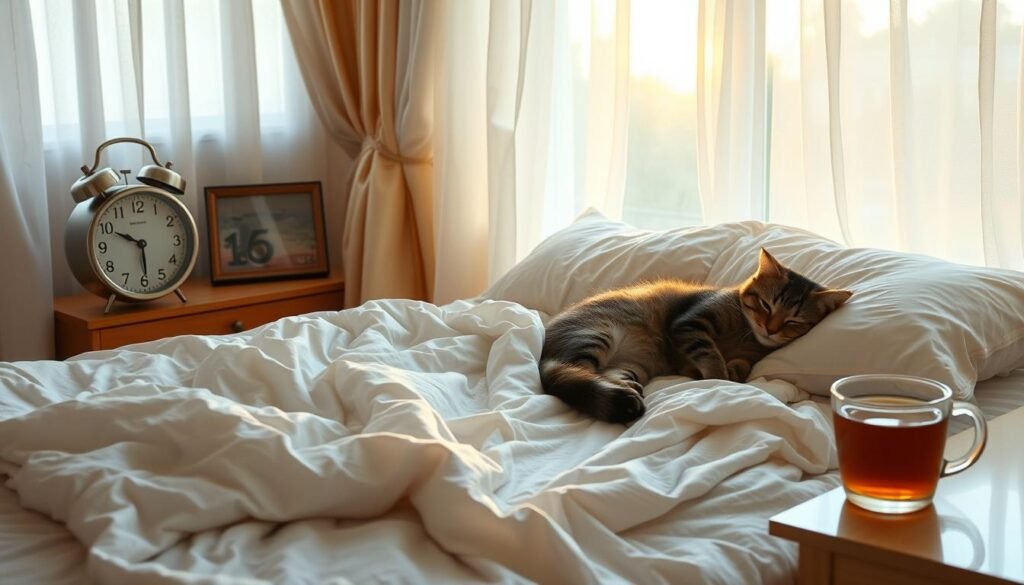Do you wake up at dawn feeling more tired than before sleeping? Early morning awakening troubles many, leaving them worn out. It’s a complex issue with lots of causes, but finding them helps. This piece explores the causes and solutions for waking up too early. We’ll look at insomnia, body clock changes, stress, and health problems. Understanding these can help folks find ways to sleep better.
Key Takeaways
- Insomnia is a leading factor contributing to early morning awakenings, particularly chronic insomnia.
- Cognitive behavioral therapy for insomnia (CBTI) can effectively treat chronic sleep issues.
- Anxiety and mood disorders frequently correlate with experiencing early morning awakenings.
- Obstructive sleep apnea often leads to waking up early, especially during REM sleep.
- Aging impacts sleep patterns and may reduce the overall need for sleep in older adults.
- Lifestyle modifications and healthcare interventions can enhance sleep quality.
- Common sleep disturbances during pregnancy can result in early morning awakenings, particularly in certain trimesters.
Understanding Early Morning Awakening
Many people experience early morning awakening. This disrupts their sleep cycle. It leads to lower productivity and well-being. Over 35% of individuals wake up three times a week at night. Middle-aged adults often face this due to changing sleep patterns. It’s important to know what causes sleep problems.
Different things can cause waking up too early. For example, it’s harder for older adults to stay asleep. Women facing big hormonal changes also have sleep troubles. Things like not going to bed at the same time can also affect how well you sleep.
Stress is a big factor in not sleeping well. It can mess with your body, making it hard to sleep. Research shows that deep breathing can help reduce stress. This improves sleep. We need to look into these factors to improve sleep habits.
What Are the Common Causes?
Knowing why we wake up too early can help us sleep better and improve our health. Sleep issues can come from body changes, mental health, and how we live. As we age, it might get harder to stay asleep.
Worrying a lot can make us wake up earlier than we want. A busy mind can make our sleep choppy. If you’re always stressed, you might find yourself waking up in the middle of the night. Also, depression can mess up our internal clock, leading to early mornings filled with worries.
Insomnia is a big reason too. It changes with age. Young folks may have trouble falling asleep. Older adults might wake up often during the night. This is especially true for women. Signs of insomnia include not being able to fall or stay asleep, and feeling tired after waking up.
Sleep disorders like sleep apnea make things worse. Snoring a lot or feeling super tired during the day are red flags. Sleep apnea can be really bad during dream sleep, causing you to wake up too soon.

Lastly, drinking caffeine too late or an unpredictable work schedule can ruin our sleep. Understanding why we wake up early is the first step in getting better sleep.
Insomnia: A Major Factor
Insomnia is a big problem when you wake up too early. It shows up in different ways, depending on many things. Knowing the types of insomnia and what causes them helps find good treatments.
Types of Insomnia
There are two main types of insomnia: acute and chronic. Acute insomnia is short-lived, from a night to a few weeks. It’s caused by stress or changes in your life. Chronic insomnia lasts for three months or more, happening at least three nights a week.
Many things cause these types, like how you live, your mental health, and health problems.
Symptoms Associated with Insomnia
Insomnia symptoms include trouble sleeping, waking up often, and waking up too early. It leads to feeling tired during the day, being irritable, and having trouble thinking. These issues can hurt your work and happiness.
To improve sleep, it’s important to deal with these symptoms. For more on how to sleep better, check out this resource.

The Role of Circadian Rhythm
The circadian rhythm controls our sleep and wake cycle among other key functions. It works on a 24-hour cycle and is shaped by light and dark. This rhythm helps decide when we feel tired or awake and how we perform during the day.
What is Circadian Rhythm?
The circadian rhythm is our body’s natural clock, running a 24-hour cycle. It manages things like our hormone levels, metabolism, and body temperature. By syncing with our environment, it helps us stay healthy and perform well. If this cycle is thrown off, we might face sleep problems and other health issues.
How Circadian Rhythm Affects Sleep
When our circadian rhythm is off, our sleep suffers. Some might battle insomnia, feel too sleepy during the day, or wake up a lot at night. Disorders like advanced sleep phase make it hard to stay asleep. By understanding circadian rhythms, we can work on sleeping better.
Keeping a regular sleep schedule and getting plenty of daylight helps our circadian rhythm. This can make our sleep better and improve our thinking and stress levels. Studies like those on sleep deprivation show how vital our circadian rhythm is to our health. The study of sleep effects shows us why this rhythm matters.

How Stress and Anxiety Lead to Sleep Disruptions
Stress and anxiety can disrupt our sleep, often waking us up too early. Many adults struggle with anxiety, which affects their sleep. Learning how to manage stress is key to improving sleep quality.
Types of Stressors
Common stressors that affect sleep include:
- Work pressure
- Family issues
- Life transitions, such as moving or changing jobs
- Financial challenges
- Health concerns
About 20% of American adults have anxiety disorders, which often lead to sleep problems. Nearly half of people with depression also have anxiety, making sleep even harder. Anxiety and stress often cause insomnia, leading to broken sleep and problems during the day.
Managing Stress for Better Sleep
Here are some ways to manage stress and sleep better:
- Mindfulness and meditation: These practices help calm down before bed.
- Regular exercise: Working out can lower stress and help us sleep better.
- Cognitive Behavioral Therapy (CBT): This method is great for dealing with anxiety and insomnia.
- Lifestyle changes: Cutting caffeine and alcohol before bed can improve sleep.
It’s important to tackle chronic stress. It can reduce deep sleep and cause issues in REM sleep. Recognizing and dealing with stress helps create a peaceful sleep environment.
Age-Related Sleep Changes
Entering the golden years brings significant age-related sleep changes. The way older adults sleep changes, affecting how long and well they sleep.
How Aging Affects Sleep Patterns
Older adults usually sleep about 6.5 to 7 hours each night. However, their sleep is often interrupted. They tend to wake up 3 to 4 times a night, more often than younger people. This leads to feeling tired and sleepy during the day. Mostly, they get less deep sleep, but their REM sleep stays about the same.
Health Issues in Older Adults Contributing to Sleep Problems
Many health issues can disrupt sleep for the elderly. Problems like arthritis, heart conditions, and nocturia make sleep worse. The medicines for these conditions can also disturb sleep. Up to half of older adults struggle with insomnia. This not only makes it hard to sleep but can also cause depression and irritation. It’s important to understand these issues to help improve sleep in the elderly.
| Sleep Aspect | Young Adults | Older Adults |
|---|---|---|
| Total Sleep Time | 7-8 hours | 6.5-7 hours |
| Nighttime Awakenings | 2-3 times | 3-4 times |
| Deep Sleep Stages | More present | Reduced |
| Daytime Sleepiness | Less common | More frequent |
| Insomnia Prevalence | 10-15% | 30-50% |
Exploring Other Underlying Health Conditions
Several conditions can mess with how well you sleep. Things like chronic pain or having trouble breathing can make sleep rough for 20% of those dealing with them. Asthma, for instance, troubles around 25.9 million Americans, making it hard for them to both fall asleep and stay that way. Diabetes also plays a big role, affecting sleep for about 30.3 million people in the U.S.
Psychiatric disorders are big players in messing with sleep, too. Stress can make your sleep choppy, hitting 70% of people hard. Having anxiety might make it tougher for half of those affected to even start sleeping. About 80% of people waking up too early blame it on stress messing with their sleep. And if you’re dealing with deep depression, you might join the 90% who have insomnia.
Lifestyle choices and what’s around you can also wake you up too early. Staring at screens before bed can keep 50% of us from falling asleep on time. Drinking caffeine or other stimulants close to bedtime might wake 40% of people up too early. All these things show the complex ties between health issues and how well we sleep.
Getting why these health issues mess with sleep is key to fixing sleep troubles. Conditions like an overactive thyroid, breathing problems, and needing to pee a lot at night affect tons of people. As more folks look for help with sleeping better, understanding these health conditions can make treatments more effective.
| Condition | Impact on Sleep | Percentage Affected |
|---|---|---|
| Asthma | Difficulties falling and staying asleep | 25.9 million Americans |
| Diabetes | Sleep problems due to blood sugar fluctuations | 30.3 million Americans |
| Chronic Pain Syndromes | Increased sleep disturbances | 20% of the affected population |
| Anxiety Disorders | Delays in sleep onset | 80% of early awakenings |
| Depression | Insomnia and disrupted sleep cycles | 90% of individuals with severe depression |
| Overactive Thyroid | Sleep disturbances | Millions diagnosed annually |
Sleep Disorders and Their Impact on Awakening
Sleep disorders have a big influence on how we wake up in the morning. Sleep apnea is a key issue. It causes breathing to stop and start again many times during the night. This leads to poor sleep quality and makes you feel very tired during the day.
Without treatment, people with sleep apnea often feel overly tired. They also find it hard to focus during the day.
Understanding Sleep Apnea
Studies show that not dealing with sleep apnea can make sleeping problems more common, especially as you get older. Older adults are more likely to have interrupted sleep. They find it hard to reach deep sleep stages, often waking up too early.
Other Sleep Disorders Related to Early Waking
Restless legs syndrome and periodic limb movement disorder also lead to waking up early. They cause discomfort at night, making it hard to stay asleep. Getting treatment for these disorders can make a big difference. It can help improve how well you sleep, so you feel better rested each morning.